Family Law on the Multistate Essay Exam: Highly Tested Topics and Tips
 Family Law on the Multistate Essay Exam: Highly Tested Topics and Tips
Family Law on the Multistate Essay Exam: Highly Tested Topics and Tips
Family Law is regularly tested on the MEE. Here, we give you an overview of Family Law on the MEE. We will reveal some of the highly tested topics and give you tips for approaching a Family Law MEE question.
Family Law on the Multistate Essay Exam
1. First, be aware of how Family Law is tested
Family Law is tested about once a year. Family Law generally is tested on its own. However, occasionally it will appear with a Conflict of Laws issue.
2. Be aware of the highly tested Family Law issues
The examiners tend to test several of the same issues in Family Law MEE questions. You can maximize your score by being aware of these highly tested issues. (We have a nice summary of these in our MEE One-Sheets if you want to see all of them and have them all in one place.)
Many commercial bar review courses spend a lot of time on topics that are not highly tested (e.g., general requirements of marriage, defenses to fault-based divorce, intra-family tort immunity, marital rape, family privacy, donor eggs, gestational agreements, etc.). As a result, some examinees spend a lot of time on topics that they are unlikely to see on the exam.
We recommend that you focus instead on the highly tested Family Law MEE topics.
Some of the highly tested Family Law Multistate Essay Exam issues include:
Child custody and support
Child custody and child support are regularly tested on the MEE. Here are a few subtopics that have been tested:
- Custody: custody is determined by looking at the best interests of the child.
- Child support: All states employ numerical guidelines and establish a rebuttable presumption that the award that results from applying the guidelines is correct. The guidelines must be applied in all cases, regardless of the parents’ marital status. The court will look at factors like income and earnings of the parents, the number of children and their ages, and any special needs of the children.
- Modification: custody or support can be modified if there is a substantial change in circumstances.
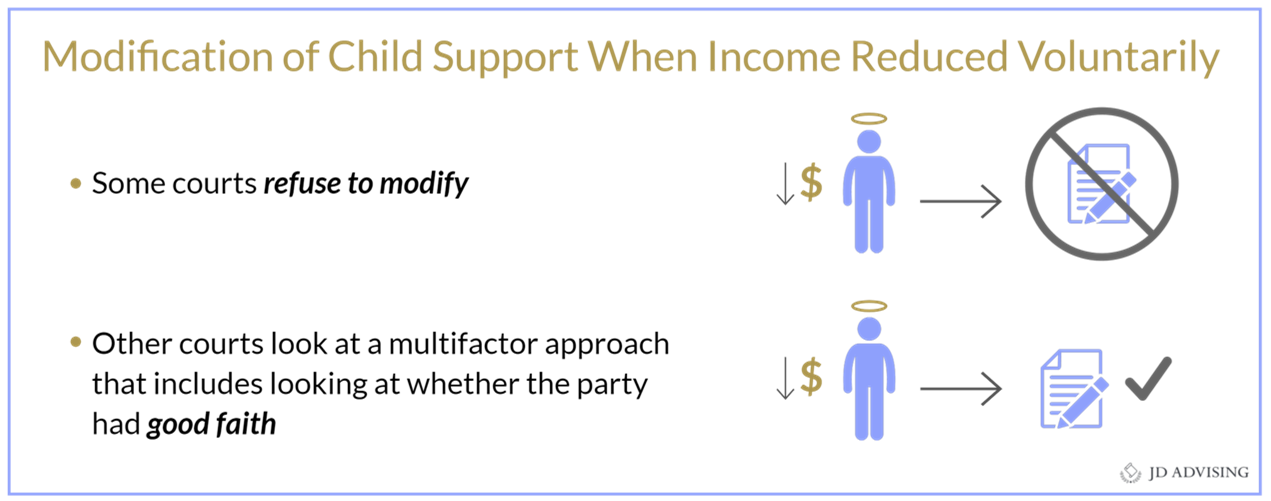
- Rights of the biological father: Biological fathers generally have rights. However, the state may make the biological father exercise his rights within a specific time (e.g., two years).
Property division and alimony
- Marital vs. separate property: Marital property is property acquired during the marriage and is subject to division. Separate property includes (mnemonic = BIG): property acquired before the marriage, an inheritance, or a gift to one party. Most states do not count professional degrees earned during the marriage as marital property. Separate property is generally not subject to division.
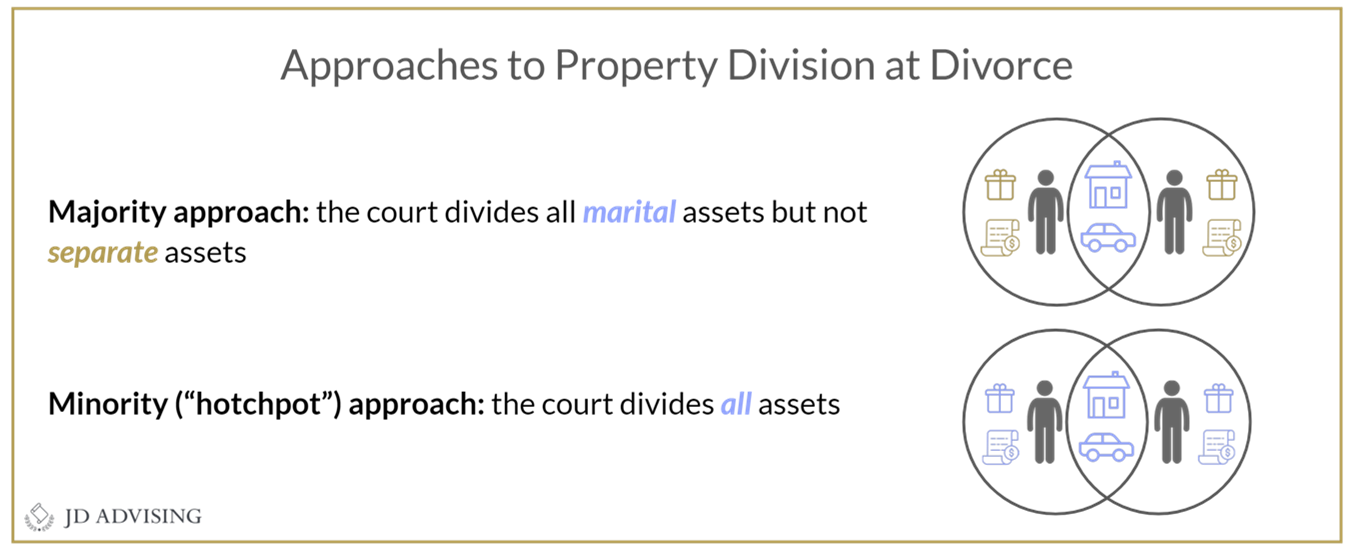
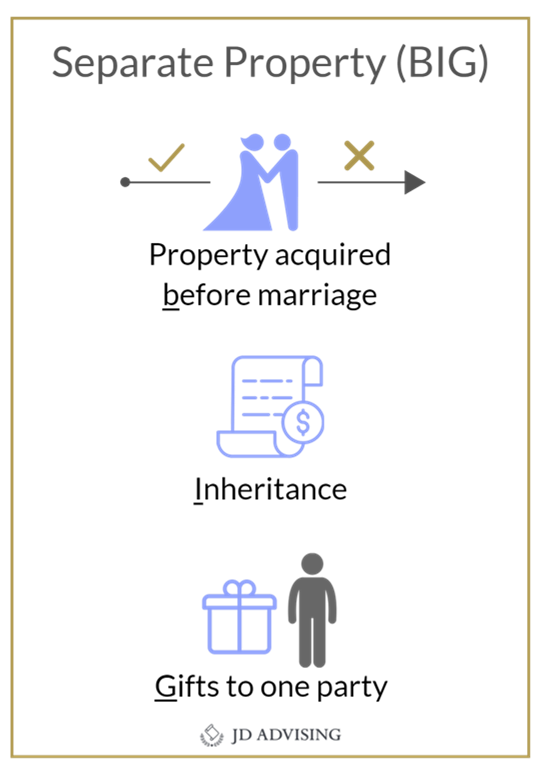
- Premarital agreement: A court will enforce a premarital agreement so long as it is voluntarily made, substantively fair, and if full disclosure of assets and obligations was made. A court will not, however, enforce a premarital agreement regarding child custody or support if it is not in the best interest of the child.
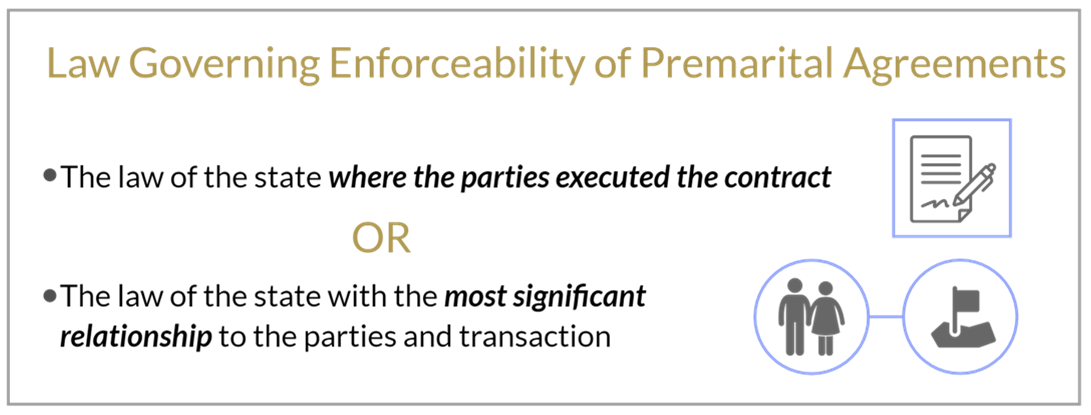
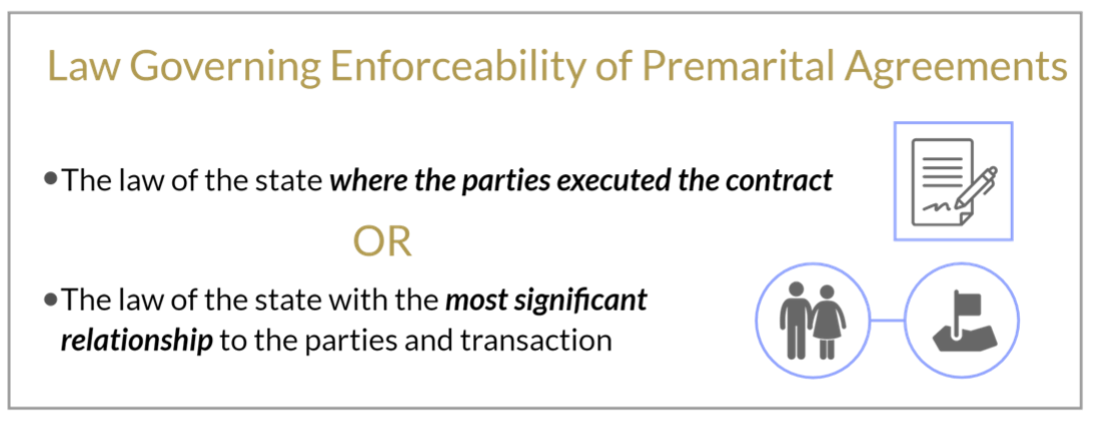
- Alimony: Alimony can be permanent, temporary, or granted in a lump sum. States consider many factors, including the parties’ financial resources and needs, marital contributions, and marital duration. Alimony awards are not final and can be modified if there has been a substantial change in circumstances.
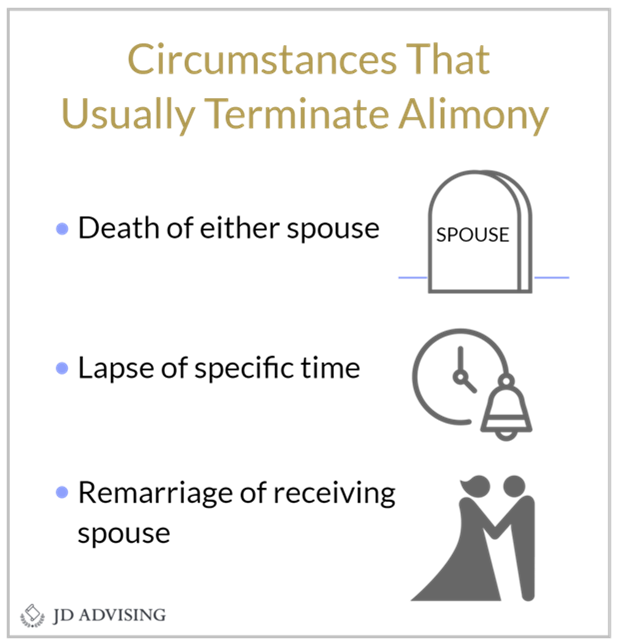
Other Family Law issues
In Family Law MEE questions, both the Uniform Interstate Family Support Act (UIFSA) and the Uniform Child Custody Jurisdiction and Enforcement Act (UCCJEA) generally are applied.
- The UIFSA governs child support. Once a child support order is registered, it may be enforced by any state. The state that originally issued a child support order has exclusive jurisdiction to modify the order if the state remains the residence of the obligee, the child, or the obligor, and at least one of the parties does not consent to the use of another forum.
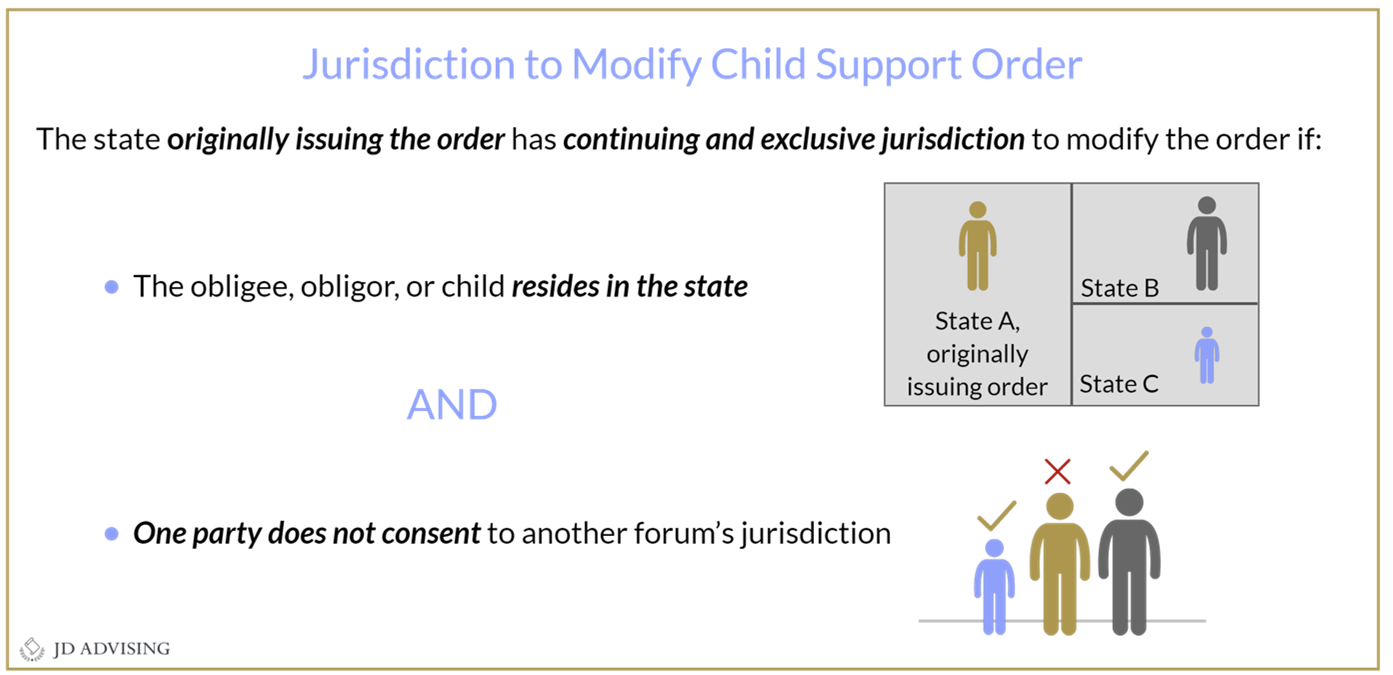
- The UCCJEA governs child custody orders. This statute incorporates various tests. Under the home state test, the “home state” has exclusive jurisdiction to modify a decree. A home state is a state where the child has lived with a parent or person acting as a parent for at least six consecutive months immediately before the commencement of the child custody proceeding. A home state continues to have exclusive jurisdiction to issue a custody order for six months after a child leaves the state, so long as a parent (or person acting as a parent) still lives in the state. The significant connections test applies if a child has no home state. Under this test, a state may exercise jurisdiction based on (1) significant connections with the child and at least one parent and (2) the existence of substantial evidence relating to child custody in the forum jurisdiction.
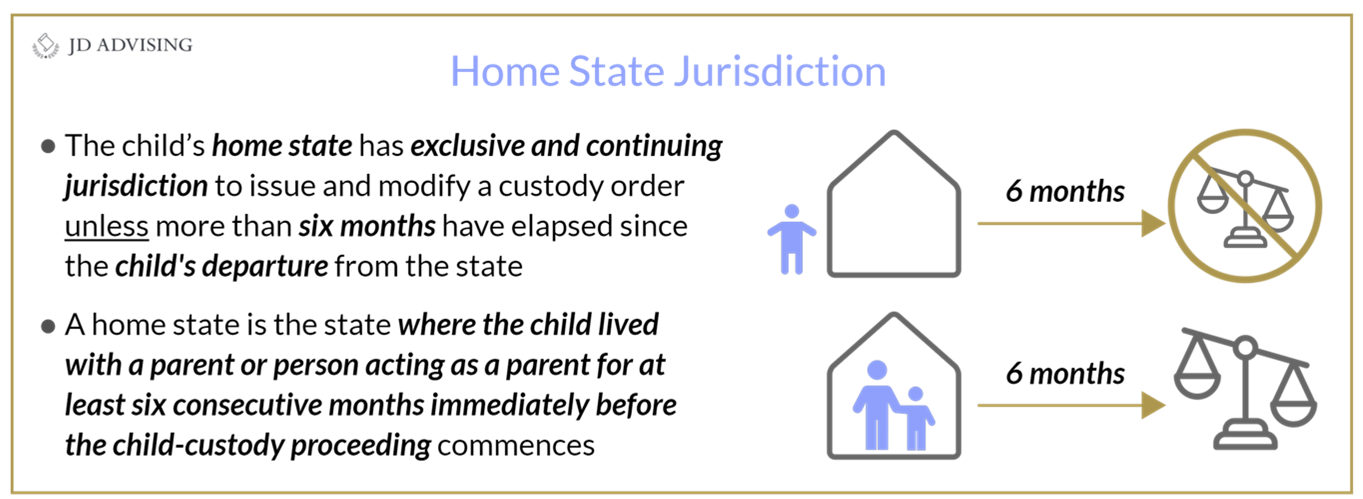
3. Be aware of how certain Family Law topics are tested
Certain Family Law topics tend to be tested in specific ways. For example:
- Retroactive modification of child support has been tested regularly. If you remember that federal law forbids retroactive modification of child support (absent circumstances like fraud), you will answer this question correctly. The outcome has always been the same on the MEE!
- When the UCCJEA is tested, generally the Parental Kidnapping Prevention Act (PKPA) is also mentioned. The PKPA is very similar to the UCCJEA, and the result is virtually always the same. However, it does not hurt to mention that “the result would be the same under the PKPA” if you see a UCCJEA issue tested.
These are just some examples of how specific topics are tested. The best way to master these topics is to practice past MEEs!
4. Practice!
Practice is critical if you want to master Family Law on the MEE. You will get exposed to the kinds of issues the examiners like to test as well as how they tend to be tested.
Here, we have provided you with some links to free Family Law MEE questions and NCBE point sheets. (If you would like to purchase a book of Family Law MEE questions and NCBE point sheets from 2000 to the most recent administration, check out our MEE books here. You can also see some additional exams on the NCBE website for free here.)
- July 2021 Family Law MEE: this MEE covers personal jurisdiction, PKPA, UCCJEA, UIFSA.
- October 2020 Family Law MEE: this MEE covers UIFSA; Reduce child support award when material/substantial change in circumstances; and spousal support modifiable—substantial change in circumstances (alimony).
- July 2020 Family Law MEE: this MEE covers a state may grant divorce if person is domiciled; state may grant custody even if no PJ over other respondent parent; state may not grant property because need PJ over respondent; fault basis may be established for divorce; and best interest of the child factors.
- July 2019 Family Law MEE: this MEE covers marriage support obligations; nonintervention doctrine; parental decisions including medical decisions are subject to limitations; UCCJEA, PKPA; custody dispute of a party who is not a parent; and wishes of a child in custody determination.
- February 2016 Family Law MEE: this MEE covers premarital agreements and division of marital vs. separate property assets.
Go to the next topic, Real Property.
Seeking MEE Expertise?
🌟 Freebies & Discounts
- Free Bar Exam Resource Center: Explore for leading guides, articles, and webinars.
- Expert-Crafted Bar Exam Guides: Unveil insights on high-frequency MEE topics and strategies for success.
- Free Webinars: Engage with top bar exam experts.
🔥 Top-Rated MEE Resources
- MEE One-Sheets: Boost your confidence with our most popular bar exam product!
- Bar Exam Outlines: Our comprehensive and condensed bar exam outlines present key information in an organized, easy-to-digest layout.
- NEW MEE Mastery Class: Unearth focused, engaging reviews of essential MEE topics.
- Bar Exam Crash Course and Mini Outlines: Opt for a swift, comprehensive refresher.
- MEE Private Tutoring and feedback: Elevate your approach with tailored success strategies.
- MEE Course: Preview our acclaimed five-star program for unmatched instruction, outlines, and questions.
🔥 NEW! Dive deep into our Repeat Taker Bar Exam Course and discover our unrivaled Platinum Guarantee Pass Program.



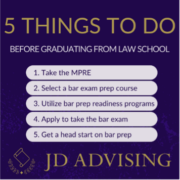
Leave a Reply
Want to join the discussion?Feel free to contribute!